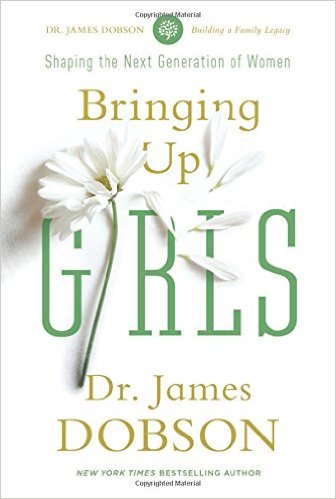Of all the books I have been reading from Focus on the Family, this one brought me to tears several times. Oh, and I promised myself to be tough and just “get the principles!” I knew what Dr. Dobson was trying to do. He was being Oprah – making me cry about raising a little girl. And I was determined not to let him.
But he got me anyway. Once I read the poem about the hope chest song, I lost it. But there is so much more to this book than just sentimental ideas and feel-good little poems to move a tired mom from bitterness to sweetness again.
Dr. Dobson shares not just research findings on raising daughters, but also simplified brain facts. The brain of a girl is different from the brain of a boy. Sorry, feministas of the world, we are simply different from the guys. Different does not mean inferior or weaker. Different means different.
We are told the self-image of girls is very fragile. Successful women like Oprah Winfrey and Chris Evert kept pushing themselves to achieve in order to feel like they had some worth. While the whole world was wowed by their feats, Oprah and Chris and others like them went home wondering if they have any self-worth. See any successful women around you? They are probably pushing themselves to succeed because of their low self-esteem (emphasis on probably).
There is also practical advice on how to interact with daughters. One of such advice is how to teach the art of conversation by using a game with a tennis ball: talking together is a game called conversation. It only works if the ball is tossed back. When a person throws a question at you and you hold it by not answering fully or properly, you are not playing the game right.
The book also covers some manners and gives at least two other books we could use to teach children manners. Of course, Dobson insists on making clear that a daughter’s relationship with her daddy will haunt her for the rest of her life. (I know because I married somebody who looks like my dad, though they could not be more different in other ways).
Then, there is the relationship with their mammas: promiscuity happens in girls who are not well-connected to their moms. You probably know one or two girls who made that mistake in their life, as I know some.
Dr. Dobson shares a John Adams quote which is essentially about homeschooling (in a broader sense) and, at the very least, it is about parenting. Here’s brief part of it: “The foundations of national morality must be laid in private families. In vain are schools, academies and universities instituted if loose principles and licentious habits are impressed upon children in their earliest years. The mothers are the earliest and most important instructors of youth.”
More practical advice: are you too exhausted to put your children to bed? You are making a mistake. Children share things at bedtime that they would not otherwise share with their parents. So be there for one last talk and build a stronger relationship with your children by listening.
The female brain is explained in the book, as I said above, and, frankly, I understood myself a little bit better. Expect a full presentation on hormonal changes from birth until adulthood.
“Girls are made of sugar and spice and everything nice, but boys are made out of snakes and snails and puppy dog tails.” I used to see that on my children’s newborn nightgowns. From this book, I found out these were quotes from Robert Southey, What Folks Are Made Of. You learn all sorts of things when you read.
The book ends with a list of resources for further study – lots of books and CDs to listen to with your adolescents or pre-adolescents when the time comes.

Pingback: Tuesday Tome Week 45 - Bringing Up Boys